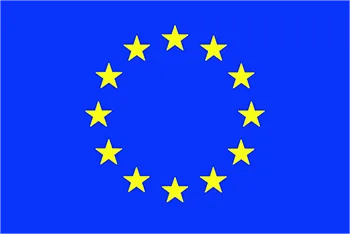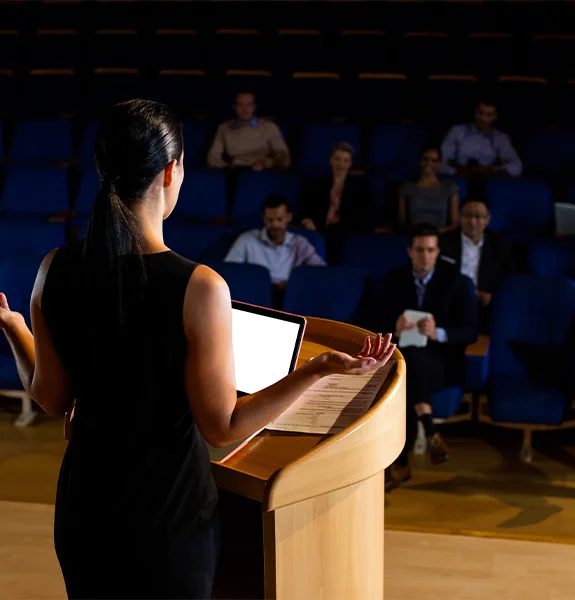Ανάπτυξη δεξιοτήτων δημόσιας ομιλίας των νέων για μια δημοκρατική κοινωνία στη σύγχρονη Ευρώπη

Κωδικός Έργου: 2022-1-SE02-KA220-YOU-000086337
Καλώς ήρθατε στο πρόγραμμα Το έργο Speak it Up! στο επίκεντρο ενός συνεδρίου !
Ο κύριος στόχος του έργου Speak It Up ήταν να παρέχει ένα σύγχρονο, μη τυπικό εκπαιδευτικό πακέτο, που αποτελείται από μια εφαρμογή και ένα επιτραπέζιο παιχνίδι, για εκπαιδευτές και εργοδότες νέων, με σκοπό την ανάπτυξη της ικανότητας δημόσιας ομιλίας των νέων (ηλικίας 18-30 ετών) στον τομέα της πολιτικής.
- Δημιούργησε ένα καινοτόμο μη τυπικό εκπαιδευτικό πακέτο για τους εκπαιδευτές και εργοδότες νέων για να τους βοηθήσουν να αναπτύξουν και/ή να βελτιώσουν τις δεξιότητες ζωής τους που σχετίζονται με τη δημόσια ομιλία.
- Δημιούργησε μια διαδραστική εφαρμογή και ένα διασκεδαστικό παιχνίδι μάθησης για να συμπληρώσει την εκπαίδευση των ομάδων-στόχων, ώστε να προσελκύσουν το ενδιαφέρον των νέων για τη μαθησιακή τους διαδικασία.
- Υποστήριξε τις διαδικασίες που θα χρησιμοποιούσαν οι εκπαιδευτές και οι εργαζόμενοι στη νεολαία για να παρακινήσουν τους νέους να συμμετάσχουν σε δημοκρατικές δομές και θεσμούς μέσω πρακτικών δραστηριοτήτων.

Περισσότερα για το έργο
Σύμφωνα με τον Sloam (2014), υπάρχει ισχυρή συσχέτιση μεταξύ της εμπλοκής των ατόμων ηλικίας 15 έως 24 ετών και της συνολικής συμμετοχής στην ΕΕ. Ωστόσο, το μορφωτικό επίπεδο ενός παιδιού συνδέεται στενότερα με την κοινωνικοοικονομική κατάσταση, η οποία αποτελεί βασικό παράγοντα που καθορίζει την ενασχόληση των νέων με τα κοινά και την πολιτική.
Σύμφωνα με τα ευρήματα του Sloam το 2014, υπήρχε μια ενισχυμένη, απελευθερωμένη σχέση μεταξύ της εκπαίδευσης και της πολιτικής δραστηριοποίησης. Ο Sant (2015) διαπίστωσε ότι ενώ ακόμη και οι νέοι είναι επιφυλακτικοί απέναντι στην παραδοσιακή εκλογική πολιτική, είναι σε θέση να διακρίνουν μεταξύ αυτών των παλαιών μορφών πολιτικής δέσμευσης και των πιο σύγχρονων εναλλακτικών μορφών. Η πολιτική συμμετοχή θα πρέπει να αντιμετωπίζεται ως μια προοδευτική διαδικασία, σύμφωνα με τον Emler (2011). Η πολιτική που τυγχάνει προσοχής πρέπει να θεωρηθεί ως σημείο στροφής.
Επιπλέον, κατά τη διάρκεια των συζητήσεων των ομάδων εστίασης, οι αντιλήψεις των νεαρών συμμετεχόντων για την πολιτική συμμετοχή περιλάμβαναν τις ιδέες της συμμετοχής στην πολιτική, της ενημέρωσης για την πολιτική και της ύπαρξης ποικίλων πολιτικών προοπτικών (Xenos, Vromen, & Loader, 2014). Οι Grasso και Smith (2022) ανακάλυψαν ότι υπάρχουν διαφοροποιήσεις μεταξύ των φύλων όσον αφορά την πολιτική δραστηριότητα των νέων ανδρών και των νέων γυναικών σε διάφορες χώρες. Ανακάλυψαν, ωστόσο, ότι οι νεαρές γυναίκες συμμετέχουν περισσότερο στην κοινωνία και είναι πιο πιθανό να υποβάλουν υπογραφές, να μποϊκοτάρουν και να προσφέρουν εθελοντική εργασία (Grasso & Smith, 2022).
Με βάση την προηγούμενη συζήτηση, το έργο σκιαγράφησε ένα σύγχρονο άτυπο εκπαιδευτικό πρόγραμμα. Για τους εκπαιδευτές και νέους εργοδότες, περιλάμβανε ένα επιτραπέζιο παιχνίδι και μια εφαρμογή για να βοηθήσει τους νέους (ηλικίας 18 έως 30 ετών) να βελτιώσουν τις δεξιότητές τους στη δημόσια ομιλία στον πολιτικό στίβο.
Το εκπαιδευτικό πακέτο πρόσδωσε στους μαθητές ικανότητες επικοινωνίας, διαπροσωπικής επικοινωνίας, παρουσίασης και άλλες ικανότητες δημόσιας ομιλίας. Μια εφαρμογή ή ένα επιτραπέζιο παιχνίδι χρησίμευσε, ωστόσο, ως εργαλείο παράγοντα για την υποστήριξη αυτής της εμπειρίας.

Στόχοι του Έργου
Οι στόχοι του έργου ήταν οι ακόλουθοι:
- Προώθηση ενός εφευρετικού άτυπου εκπαιδευτικού πακέτου για εκπαιδευτές νέων και υπαλλήλους νεολαίας που θα βοηθήσει τους νέους να αναπτύξουν και να προωθήσουν τις δεξιότητές τους όσον αφορά τη δημόσια ομιλία.
- Επινόησε μια διαδραστική εφαρμογή και ένα διασκεδαστικό παιχνίδι μάθησης για την υποστήριξη της κατάρτισης της στοχευόμενης ομάδας με στόχο την κατανόηση του ενδιαφέροντος των νέων για μάθηση.
- Κινητοποίησε την διαδικασία από την οποία επωφελήθηκαν οι εκπαιδευτές και οι εργαζόμενοι στη νεολαία για να ενθαρρύνουν τους νέους να συμμετάσχουν στη δημοκρατική ζωή και τους θεσμούς μέσω της συμμετοχής τους σε πραγματικές δραστηριότητες.
Στοχευμένο Κοινό
Στις ομάδες-στόχους του προγράμματος Speak It Up περιλαμβάνονταν οι εξής:
-
Εργαζόμενοι σε θέματα νέων και εκπαιδευτές:
Είχαν την ευκαιρία να συμμετάσχουν σε διάφορες φάσεις του έργου. Οι συμμετέχοντες απέκτησαν σημαντικές δεξιότητες και γνώσεις και αλληλεπίδρασαν με συνομηλίκους από τα έθνη-εταίρους του έργου συζητώντας θέματα που σχετίζονται με τη συμμετοχή των νέων και την ενεργό συμμετοχή των πολιτών. - Νέοι/Νεολαία: Οι νέοι θα κλήθηκαν να συμμετάσχουν σε δραστηριότητες του έργου, όπως η κατάρτιση και οι πολυθεματικές εκδηλώσεις, προκειμένου να επιτευχθεί το καλύτερο συνολικό αποτέλεσμα του έργου.
- Άλλοι ενδιαφερόμενοι φορείς, συμπεριλαμβανομένων εκπαιδευτικών ιδρυμάτων και ιδρυμάτων επαγγελματικής εκπαίδευσης και κατάρτισης, οργανώσεων νεολαίας, ΑΕΙ, φορέων λήψης αποφάσεων και χάραξης πολιτικής κ.λπ.
- Τα μέλη του προσωπικού και οι συνεργάτες που σχετίζονταν με το έργο συμμετείχαν άμεσα στην ανάπτυξη του, γεγονός που θα βελτίωσε τις γνώσεις και τις ικανότητές τους σε θέματα δημόσιας ομιλίας, κατάρτισης και παιχνιδοποίησης σε σχέση με τον τομέα της νεολαίας.
